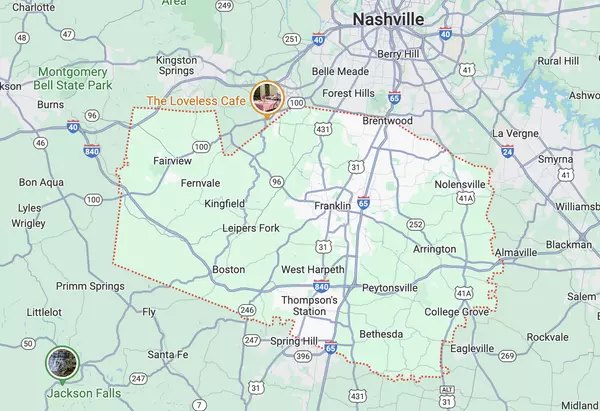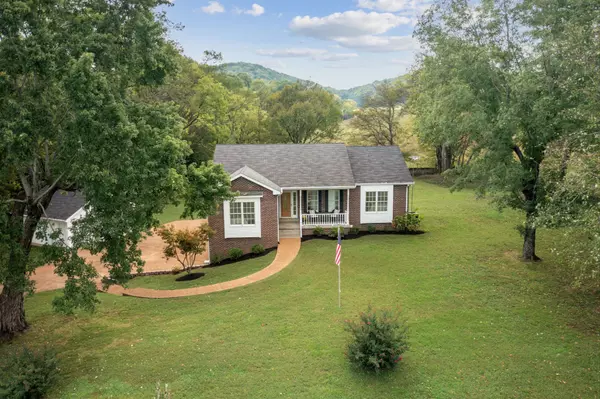
Williamson County TN Housing Market Trends
Williamson County TN Housing Market Trends: A Comprehensive Analysis As a real estate professional, I have been closely monitoring the housing market trends in Williamson County, TN. This county, located just south of Nashville, has seen a surge in demand for housing in recent years due to its mix of urban and rural lifestyles, top-rated schools, and luxurious properties. In this article, I will provide an overview of the Williamson County TN housing market, including historical market trends, current market conditions, and forecasted housing market trends. Over the past decade, Williamson County has experienced significant growth in its housing market. According to recent data, the median home price in Williamson County is $937K, up 16.4% compared to last year. On average, homes in Williamson County sell after 43 days on the market compared to 54 days last year. The county has seen an increase in the number of homes sold, with 402 homes sold in April 2024, up from 319 last year. These numbers indicate a strong seller's market with high demand and low inventory. As the housing market continues to evolve, it is important to understand the current market conditions and forecasted trends to make informed decisions as a buyer or seller. In the following sections, I will dive deeper into the Williamson County TN housing market to provide insights into buyer and seller behaviors, the impact of economic factors, real estate investment opportunities, and advice for homebuyers and sellers. Key Takeaways Williamson County, TN has experienced significant growth in its housing market over the past decade, with a median home price of $937K and a strong seller's market with high demand and low inventory. Understanding current market conditions and forecasted trends is crucial for making informed decisions as a buyer or seller in the Williamson County TN housing market. In the following sections, I will provide insights into buyer and seller behaviors, the impact of economic factors, real estate investment opportunities, and advice for homebuyers and sellers. Overview of Williamson County TN Housing Market I have been closely monitoring the Williamson County TN housing market trends and have observed some interesting patterns. Williamson County is located in the Middle Tennessee region and is known for its affluent neighborhoods, top-rated schools, and a high quality of life. According to recent data from Redfin, the median home price in Williamson County was $937K in April 2024, which represents a 16.4% increase from the previous year. Homes in Williamson County sell relatively quickly, with an average of 43 days on the market, compared to 54 days last year. In April 2024, there were 402 homes sold in Williamson County, which is a significant increase from 319 homes sold in the same month last year. The Rocket Homes data shows that the inventory of 1 bedroom homes decreased by 18.8%, 2 bedroom homes decreased by 2.9%, 3 bedroom homes decreased by 3.3%, 4 bedroom homes increased by 10.7%, and 5+ bedroom homes decreased by 0.9% in May 2024 compared to the previous month. This indicates that the demand for larger homes is increasing in Williamson County. In addition, Dale Dudley reports that May 2024 was a particularly active month in the county's real estate market, with 484 properties closing in Williamson County during that month. Dudley also notes that the average sales price in May 2024 was $1.2 million, which is a 21% increase from the same month last year. Overall, the Williamson County TN housing market is experiencing strong demand, particularly for larger homes, and is currently favoring sellers due to the low inventory of available homes. However, it is important to note that the housing market can be unpredictable and can change quickly. I will continue to monitor the Williamson County TN housing market trends and provide updates as necessary. Historical Market Trends Annual Sales Data I have analyzed the annual sales data for Williamson County from 2010 to 2023. The data shows that there has been a steady increase in the number of homes sold each year, with the exception of 2020, which was affected by the COVID-19 pandemic. In 2023, a total of 4,872 homes were sold in Williamson County, which is a 7.5% increase from the previous year. Price Fluctuations Over Time The median home price in Williamson County has been steadily increasing over the past decade. In 2010, the median home price was $310,000, and by 2023, it had increased to $800,000. However, there have been periods of fluctuation in the housing market. For example, in 2018, the median home price dropped to $640,000, but it quickly rebounded in the following years. Comparative Analysis with Neighboring Counties When compared to neighboring counties, Williamson County has consistently had a higher median home price. In 2023, the median home price in Williamson County was $800,000, while the median home price in Davidson County was $400,000, and in Rutherford County, it was $375,000. Despite the higher prices, Williamson County has continued to attract homebuyers due to its desirable location, excellent schools, and high quality of life. Overall, the historical market trends in Williamson County indicate a strong and stable housing market, with steady increases in both the number of homes sold and median home prices over time. Current Market Conditions Average Home Prices As of April 2024, the median home price in Williamson County, TN was $937K, up 16.4% compared to the previous year Redfin. This indicates a strong seller’s market, with high demand and low inventory driving up prices. Inventory Levels Inventory levels in Williamson County, TN are relatively low, with a decrease in the number of homes available for sale in May 2024 compared to the previous month Rocket Homes. The inventory of 1 bedroom homes decreased by 18.8%, 2 bedroom homes decreased by 2.9%, 3 bedroom homes decreased by 3.3%, 4 bedroom homes increased by 10.7%, and 5+ bedroom homes decreased by 0.9%. Days on Market Homes in Williamson County, TN are selling quickly, with an average of 43 days on the market in April 2024 Redfin. This is a decrease from 54 days in the previous year, indicating a strong demand for homes in the area. Sales Volume The number of homes sold in Williamson County, TN increased in April 2024 compared to the previous year Redfin. There were 402 homes sold in April 2024, up from 319 in the previous year. This increase in sales volume is likely due to the strong demand for homes in the area and the low inventory levels. Buyer and Seller Behaviors As a real estate agent in Williamson County, TN, I have observed various buyer and seller behaviors that impact the housing market trends in the area. In this section, I will discuss the demographics of home buyers, seasonal trends in buyer activity, and seller pricing strategies. Demographics of Home Buyers The demographics of home buyers in Williamson County, TN have been changing over the years. While the county has traditionally attracted families with children due to its excellent schools, there has been an increase in the number of retirees and empty nesters moving to the area. These buyers are typically looking for smaller homes or condos that are low maintenance and close to amenities like shopping, dining, and healthcare. Another trend in the demographics of home buyers is the increase in diversity. Williamson County has become more diverse in recent years, and this is reflected in the home buying market. There has been an increase in the number of buyers from different ethnic and cultural backgrounds. This trend is expected to continue in the coming years. Seasonal Trends in Buyer Activity The housing market in Williamson County, TN is affected by seasonal trends in buyer activity. Generally, the spring and summer months are the busiest times of the year for home sales. This is when the weather is good, and families are looking to move before the start of the new school year. The fall and winter months are typically slower, although there are still buyers looking for homes during this time. It is important for sellers to be aware of these seasonal trends when listing their homes. They may want to consider listing their homes during the peak season to take advantage of the increased buyer activity. Seller Pricing Strategies Sellers in Williamson County, TN use different pricing strategies to sell their homes. Some sellers price their homes aggressively to generate interest and create a bidding war. This strategy can be effective in a seller's market when there are more buyers than homes for sale. Other sellers may price their homes slightly higher than market value to leave room for negotiation. This strategy can be effective in a buyer's market when there are more homes for sale than buyers. Overall, the buyer and seller behaviors in Williamson County, TN have a significant impact on the housing market trends in the area. As a real estate agent, it is important to be aware of these behaviors to provide the best service to clients. Impact of Economic Factors As with any housing market, the Williamson County TN housing market is influenced by various economic factors. In this section, I will discuss the impact of interest rates, employment rates, and local economic policies on the housing market. Interest Rates Influence Interest rates play a significant role in the housing market as they affect the affordability of homes. In May 2024, the maximum effective interest rate for home loans in Tennessee was 8.38% [1]. This rate is high compared to rates over the last five years but aligns closely with the 20-year average of 7.5%. High-interest rates can make homes less affordable, which can lead to a decrease in demand and a decrease in home prices. Conversely, low-interest rates can make homes more affordable, which can lead to an increase in demand and an increase in home prices. Employment Rates Employment rates also have an impact on the housing market. When employment rates are high, people have more money to spend on housing, which can lead to an increase in demand and an increase in home prices. Conversely, when employment rates are low, people have less money to spend on housing, which can lead to a decrease in demand and a decrease in home prices. In Williamson County, the employment rate was 3.4% in May 2024 [3]. This is a good sign for the housing market as it indicates that people in the area have stable employment and are more likely to be able to afford homes. Local Economic Policies Local economic policies can also have an impact on the housing market. Policies that encourage economic growth and job creation can lead to an increase in demand for housing and an increase in home prices. Conversely, policies that discourage economic growth and job creation can lead to a decrease in demand for housing and a decrease in home prices. In Williamson County, there are several economic policies in place to encourage growth and job creation, including tax incentives for businesses and investments in infrastructure [5]. These policies have helped to create a strong local economy, which has had a positive impact on the housing market. Overall, economic factors play a significant role in the Williamson County TN housing market. Interest rates, employment rates, and local economic policies all have an impact on demand for housing and home prices. By understanding these factors, homebuyers and sellers can make informed decisions about the housing market. Forecasted Housing Market Trends Expert Predictions Based on expert predictions, the housing market in Williamson County, TN is expected to continue to grow at a steady pace in the coming years. According to Norada Real Estate Investments, the average home value in Tennessee is expected to increase by 5.6% in 2024. This is good news for homeowners in Williamson County, as the county consistently outperforms the state average in terms of home values. Potential Market Disruptors While the housing market in Williamson County is expected to remain strong, there are some potential disruptors that could impact the market. One of the biggest factors is the overall health of the national economy. If the economy experiences a downturn, it could lead to a decrease in demand for housing, which could in turn lead to a decrease in home values. Another potential disruptor is changes in interest rates. If interest rates rise significantly, it could make it more difficult for some buyers to afford a home, which could lead to a decrease in demand and home values. Long-Term Investment Outlook Despite the potential disruptors, the long-term investment outlook for the housing market in Williamson County remains positive. The county's strong economy, high quality of life, and desirable location make it an attractive place for people to live. This, in turn, drives demand for housing and helps to support home values. Overall, I am confident in the continued growth of the housing market in Williamson County, TN. While there are always potential disruptors to watch out for, the county's strong fundamentals and positive outlook make it a great place to invest in real estate. Impact of Development and Infrastructure As a real estate professional, I keep a close eye on the development and infrastructure of Williamson County, TN, as it has a significant impact on the housing market trends. In this section, I will discuss the impact of development and infrastructure on the housing market trends in Williamson County. New Construction Projects New construction projects in Williamson County are a significant factor in the housing market trends. The new construction projects offer homebuyers the opportunity to purchase a brand new home in a desirable location. The new homes often come with modern amenities and energy-efficient features, making them attractive to buyers. In addition, new construction projects can increase the overall supply of homes in the market, which can help to stabilize the housing prices. Transportation and Accessibility Transportation and accessibility are crucial factors that affect the housing market trends in Williamson County. The county has a well-developed transportation system, including highways, interstates, and public transportation. The transportation system makes it easy for residents to commute to work or travel to nearby cities. Easy accessibility to major highways and interstates also makes it easier for homebuyers to find homes in desirable locations. The proximity to transportation also increases the value of properties, making them more attractive to buyers. Schools and Community Services The quality of schools and community services is another factor that affects the housing market trends in Williamson County. The county has a reputation for having some of the best schools in the state, which attracts families with children. The quality of schools also affects the value of properties, as homes in areas with good schools tend to be more expensive. In addition, the county offers a range of community services, including parks, libraries, and community centers, which contribute to the overall quality of life in the area. In conclusion, the development and infrastructure of Williamson County have a significant impact on the housing market trends. New construction projects, transportation and accessibility, and the quality of schools and community services are all factors that contribute to the desirability of the area, and therefore affect the housing market trends. As a real estate professional, I will continue to monitor these factors closely to provide my clients with the most up-to-date information on the housing market trends in Williamson County. Real Estate Investment Opportunities As a real estate investor, Williamson County TN is an attractive market to consider. The county has consistently been a desirable location for homebuyers due to its blend of urban and rural lifestyles and luxurious properties. According to Redfin, in April 2024, Williamson County home prices were up 16.4% compared to last year, selling for a median price of $937K. Investors can take advantage of the strong housing demand in the area by purchasing rental properties. With the median rent for a 2-bedroom apartment in Williamson County at $1,800 according to Rocket Homes, investors can generate a steady stream of passive income. Additionally, with the county's low unemployment rate of 2.5% according to ZeroDown, there is a strong pool of potential tenants. Another investment opportunity in Williamson County is flipping properties. With the county's strong housing demand, investors can purchase distressed properties, renovate them, and sell them for a profit. However, it is important to note that flipping properties can be a risky investment strategy and requires a significant amount of capital, time, and expertise. Overall, Williamson County TN presents a range of real estate investment opportunities for investors looking to generate passive income or profit from flipping properties. With its strong housing demand, low unemployment rate, and luxurious properties, the county is a great market to consider for real estate investing. Advice for Homebuyers and Sellers As a knowledgeable real estate agent in Williamson County, TN, I have some advice for both homebuyers and sellers in this hot market. For Homebuyers If you're looking to buy a home in Williamson County, be prepared to act fast and make competitive offers. With low inventory and high demand, homes are selling quickly and often with multiple offers. It's important to work with a real estate agent who has experience in this market and can help you navigate the process. Before you start your search, get pre-approved for a mortgage so you know exactly how much you can afford. This will also make your offer more attractive to sellers. Be open to different neighborhoods and property types, as your dream home might not be available in your first choice location or style. For Sellers If you're considering selling your home in Williamson County, now is a great time to do so. With low inventory and high demand, sellers are often receiving multiple offers and selling for above asking price. However, it's important to work with a real estate agent who can help you price your home correctly and market it effectively. Make sure your home is in top condition before listing it. This includes decluttering, cleaning, and making any necessary repairs. Consider staging your home to make it more attractive to buyers. And be prepared to move quickly once your home is on the market, as you may receive offers within days or even hours. Overall, the Williamson County, TN housing market is a competitive and fast-paced environment for both buyers and sellers. By working with a knowledgeable real estate agent and following these tips, you can successfully navigate the market and achieve your real estate goals. Frequently Asked Questions What are the current trends in the Williamson County, TN housing market? As of June 2024, the Williamson County, TN housing market is experiencing a high demand for homes with limited inventory. This has led to an increase in home prices and a decrease in the number of days homes are on the market before being sold. How has the median home price in Williamson County, TN changed over the past year? According to Redfin, the median home price in Williamson County, TN was $937K in April 2024, which is a 16.4% increase compared to the previous year. This indicates a strong seller's market in the area. What is the average price per square foot for homes in Williamson County, TN? As of May 2024, the average price per square foot for homes in Williamson County, TN was $248 according to ZeroDown. However, this can vary depending on the location, size, and condition of the home. What factors are contributing to the cost of housing in Franklin, TN? Several factors are contributing to the cost of housing in Franklin, TN, including a growing population, limited inventory, and high demand for homes in the area. Additionally, the city's desirable location and quality of life amenities are attracting more homebuyers to the area. How does the housing market in Williamson County compare to other hot markets in Tennessee? According to a recent report by Realtor.com, Williamson County is one of the hottest housing markets in Tennessee. The area's strong economy, quality of life, and desirable location make it a popular choice for homebuyers. What are the projections for housing market growth in Williamson County, TN? Based on current trends and projections, the housing market in Williamson County, TN is expected to continue to grow in the coming years. However, this growth may be limited by factors such as limited inventory and rising interest rates.

Move to Williamson County TN: A Comprehensive Guide to Relocating to One of the Fastest-Growing Counties in Tennessee
Is Williamson County TN a good place to live? If you're looking to move to an area that offers a mix of city and countryside living, Williamson County, TN, might be the perfect place for you. Located just south of Nashville, Williamson County offers a unique blend of urban and rural lifestyles, making it an ideal location for families, young professionals, and retirees alike. Williamson County has a lot to offer, from its charming historic downtowns to its beautiful rolling hills and parks. The area is home to many large employers, including over 40 company headquarters, which creates a thriving economy and job market. The county also boasts some of the best schools in the state, making it a popular choice for families with school-aged children. Key Takeaways Williamson County, TN offers a unique blend of urban and rural lifestyles. The area is home to many large employers, creating a thriving economy and job market. The county boasts some of the best schools in the state, making it a popular choice for families with school-aged children. Overview of Williamson County, TN I have lived in Williamson County, TN for several years now, and I can confidently say that it is one of the best places to live in the United States. Located just south of Nashville, Williamson County is known for its beautiful countryside charm, excellent schools, and low tax rates. Williamson County is home to several historic downtowns, local farmers markets, and other small-town amenities. The area is also known for its rolling hills, parks, and outdoor recreational activities. Whether you enjoy hiking, biking, or fishing, Williamson County has something for everyone. One of the biggest advantages of living in Williamson County is the job market. The area is home to many large employers, including over 40 company headquarters. The unemployment rate in the county is an incredibly low 3.3%, which is well below the national average of 6.1%. Additionally, job growth in the area is expected to explode over the next ten years, with a phenomenal 54.4% job growth rate. Another advantage of living in Williamson County is the low tax rates. The state of Tennessee has one of the nation's lowest tax burdens and no personal income tax. Williamson County has the lowest property tax rate in the Nashville MSA region at $2.22 per $100 of assessed value. This means that residents get to take advantage of Tennessee's low costs and keep more of their hard-earned money. In summary, Williamson County, TN is a great place to live for anyone who values a high quality of life, excellent schools, and a low cost of living. With its beautiful countryside charm, excellent job market, and low tax rates, it's no wonder that so many people are choosing to call Williamson County home. Reasons to Move to Williamson County As someone who has lived in Williamson County for several years, I can confidently say that there are many reasons to move to this area. From economic opportunities to healthcare services, there are several factors that make Williamson County an attractive place to live. Here are some of the top reasons why you should consider moving to Williamson County: Economic Opportunities Williamson County is home to many large employers, including over 40 company headquarters. This means that there are plenty of job opportunities available in a variety of industries. The area also has a low unemployment rate of 3.3% (compared to the national average of 6.1%), and job growth is expected to explode over the next ten years with a phenomenal 54.4% job growth! (source: Williamson Source). Additionally, the state of Tennessee has one of the lowest tax burdens in the nation, which can be advantageous for those looking to save money. Education System Williamson County is known for having an excellent education system. The county has some of the best public schools in the state, with high graduation rates and test scores. There are also several private schools in the area, which offer a variety of educational programs. For those looking to continue their education, there are several colleges and universities within driving distance, including Vanderbilt University and Belmont University. Quality of Life Williamson County is a beautiful area with rolling hills, parks, and other natural amenities. The county is close to the city of Nashville while retaining countryside charm, which means that residents can enjoy both urban and rural lifestyles. There are also historic downtowns, local farmers markets, and other small-town amenities that make Williamson County a great place to live. Healthcare Services Williamson County has some of the best healthcare services in the state. The area is home to several hospitals, including Williamson Medical Center and Vanderbilt University Medical Center. These hospitals offer a variety of medical services, from routine check-ups to specialized procedures. Additionally, there are several clinics and urgent care centers in the area, which can be convenient for those in need of medical attention. In summary, Williamson County is an attractive place to live for many reasons. From economic opportunities to healthcare services, there are several factors that make this area a great place to call home. Real Estate in Williamson County As someone who has recently moved to Williamson County, I can attest to the fact that the real estate market here is highly competitive. In this section, I'll provide an overview of the current housing market trends, the pros and cons of renting vs. buying, and some of the best neighborhoods in the area. Housing Market Trends According to Zillow, the median home value in Williamson County is $1,175,000. This is significantly higher than the median home value in Tennessee as a whole, which is $185,000. The housing market in Williamson County is highly competitive, with many homes receiving multiple offers within days of being listed. Renting vs. Buying Whether you should rent or buy a home in Williamson County depends on your individual circumstances. Renting can be a good option if you're not sure how long you'll be staying in the area or if you're not ready to commit to a mortgage. However, renting can also be expensive, with the median rent for a two-bedroom apartment in Williamson County being around $2,000 per month. Buying a home in Williamson County can be a good investment, as property values tend to appreciate over time. However, buying a home also comes with additional costs, such as property taxes, maintenance, and repairs. It's important to carefully consider your financial situation before deciding whether to rent or buy. Best Neighborhoods Williamson County is home to many great neighborhoods, each with its own unique character and charm. Some of the best neighborhoods in the area include: Franklin: This historic town is known for its charming downtown area, great schools, and beautiful homes. Brentwood: This affluent suburb is known for its excellent schools, large homes, and beautiful parks. Nolensville: This small town is known for its friendly community, great schools, and affordable homes. Overall, Williamson County is a great place to live if you're looking for a high-quality of life, great schools, and beautiful homes. However, it's important to carefully consider your options and work with a knowledgeable real estate agent to find the right home for you. Employment and Economy As someone who has lived and worked in Williamson County, I can confidently say that the job market here is thriving. The county has a diverse economy with a range of industries, including healthcare, technology, and manufacturing. In fact, Williamson County has been named one of the top 10 counties in the country for job growth. Job Market Overview According to recent data, the unemployment rate in Williamson County is well below the national average. The county has a highly educated workforce, with a large percentage of residents holding advanced degrees. This has helped attract companies to the area, as they are able to tap into a pool of skilled workers. Top Employers Some of the largest employers in Williamson County include healthcare providers like Vanderbilt University Medical Center and Community Health Systems, as well as technology companies like Nissan North America and Mars Petcare. These companies provide a range of job opportunities, from entry-level positions to high-level executive roles. Small Business Environment Williamson County also has a thriving small business community. In fact, over 80% of all businesses in the county have fewer than 50 employees. This has created a supportive and collaborative environment for entrepreneurs, with resources like the Williamson County Chamber of Commerce and the Williamson County Entrepreneurship Center providing support and guidance for small business owners. Overall, the employment and economy in Williamson County is strong and diverse, providing a range of opportunities for job seekers and entrepreneurs alike. Education and Schools As someone who values education, I am pleased to report that Williamson County, TN offers a variety of educational opportunities for students of all ages. Primary and Secondary Education Williamson County is home to an excellent public school system, Williamson County Schools (WCS), which serves over 42,000 students in grades K-12. WCS has been recognized for its academic excellence, with high graduation rates and impressive test scores. Parents can choose from a variety of schools, including traditional, magnet, and charter schools. In addition to public schools, Williamson County also has several private schools, including Montessori, Christian, and college preparatory schools. These schools offer a range of educational approaches and are a popular choice for families who prefer a more specialized education for their children. Higher Education Opportunities For those seeking higher education opportunities, Williamson County is home to several colleges and universities. Lipscomb University's satellite campus, located in Franklin, offers a variety of undergraduate and graduate programs, including business, education, and nursing. Additionally, Columbia State Community College has a campus in Franklin, which offers associate degrees, technical certificates, and workforce training programs. Finally, Tennessee State University has a satellite campus in nearby Brentwood, which offers graduate programs in education and business. Overall, Williamson County, TN is an excellent place for students of all ages to receive a high-quality education. With a variety of educational options available, families can find the perfect fit for their educational needs. Lifestyle and Recreation Moving to Williamson County means you'll have access to a wide variety of cultural attractions, outdoor activities, shopping, and dining. Here are some of the highlights: Cultural Attractions Williamson County has a rich history and a vibrant arts scene. The historic downtown areas of Franklin, Brentwood, and Nolensville are home to many art galleries, theaters, and music venues. The Franklin Theatre is a popular destination for live music, movies, and other performances. The Lotz House Museum and the Carnton Plantation are two must-visit destinations for history buffs. Outdoor Activities The county is also home to many parks, trails, and other outdoor recreation areas. The Natchez Trace Parkway, a scenic road that stretches from Mississippi to Tennessee, runs through the county and offers stunning views of the countryside. Radnor Lake State Park is a great place for hiking, birdwatching, and other outdoor activities. There are also many golf courses, tennis courts, and other sports facilities throughout the county. Shopping and Dining Williamson County has no shortage of shopping and dining options. The Cool Springs Galleria is a large indoor mall with many popular stores and restaurants. The Avenue at Murfreesboro is another popular shopping destination. There are also many locally-owned boutiques and specialty shops throughout the county. As for dining, there are many options ranging from casual to upscale. The Loveless Cafe is a must-visit for its famous Southern-style breakfast, while Puckett's Grocery and Restaurant is a popular spot for live music and Southern comfort food. Transportation and Accessibility As someone who has lived in Williamson County, TN for several years, I can confidently say that transportation and accessibility are two important factors that make this area a great place to live. In this section, I'll provide an overview of the public transportation options and major roads and highways in the area. Public Transportation Williamson County does not have a comprehensive public transportation system, but there are a few options available. The Franklin Transit Authority (FTA) provides bus service within Franklin city limits and to nearby cities like Brentwood and Nashville. The FTA also offers a paratransit service for individuals with disabilities who are unable to use regular bus service. Another option is the Music City Star commuter rail, which runs from Nashville to Lebanon with stops in Donelson, Hermitage, Mt. Juliet, and Martha. While the Music City Star does not have a stop in Williamson County, it is a convenient option for those commuting to Nashville for work. Major Roads and Highways Williamson County is well-connected to major roads and highways, making it easy to get around by car. Interstate 65 runs through the county, providing access to Nashville to the north and Huntsville, AL to the south. State Route 840, also known as the Tennessee Parkway, runs along the southern edge of the county and connects to I-65 and I-40. In addition to these major highways, there are several other important roads in Williamson County. Franklin Road and Hillsboro Road are two of the main north-south routes, while Moores Lane and McEwen Drive are two of the main east-west routes. These roads can get congested during rush hour, but overall traffic is manageable compared to larger cities. Overall, while public transportation options may be limited, the well-connected road network in Williamson County makes it easy to get around by car. Community and Social Life Moving to Williamson County means immersing yourself in a vibrant community with a rich social life. Here are some of the ways you can get involved: Community Events Williamson County hosts a variety of events throughout the year, including festivals, concerts, and farmers markets. The Franklin Main Street Festival is a popular annual event that attracts thousands of visitors to downtown Franklin. The Brentwood Summer Concert Series is another great way to enjoy live music in a beautiful outdoor setting. Check out Visit Franklin for a full calendar of events. Social Organizations There are many social organizations in Williamson County that cater to a variety of interests. Whether you're interested in gardening, hiking, or book clubs, there's a group for you. The Williamson County Parks and Recreation Department offers a variety of programs and classes, including fitness classes, art classes, and sports leagues. The Williamson County Public Library hosts book clubs, author talks, and other literary events. Check out Meetup to find groups that share your interests. Volunteer Opportunities Volunteering is a great way to get involved in your new community and make a positive impact. There are many organizations in Williamson County that rely on volunteers to carry out their missions. The United Way of Williamson County connects volunteers with local nonprofits and community organizations. The Franklin Special School District and Williamson County Schools both offer volunteer opportunities in schools. The Friends of Williamson County Animal Center is a nonprofit organization that supports the Williamson County Animal Center through fundraising and volunteer efforts. Preparing for the Move Moving to a new place can be both exciting and overwhelming. To make the process smoother, it's important to have a plan in place. Here are some tips to help you prepare for your move to Williamson County, TN. Relocation Checklist Creating a relocation checklist can help you stay organized and on track during the moving process. Some items to include on your checklist are: Researching schools, neighborhoods, and amenities in Williamson County Contacting utility companies to set up service at your new home Changing your address with the post office, banks, and other important contacts Hiring a moving company or renting a moving truck Packing and labeling your belongings By creating a checklist, you can make sure you don't forget any important tasks and stay on schedule. Hiring Moving Services Hiring a moving company can make the moving process much easier. When looking for a moving company, it's important to do your research and find a reputable company. Some factors to consider when choosing a moving company are: Experience and reputation Price and services offered Insurance and licensing When you find a moving company you like, be sure to book them in advance to ensure availability on your moving day. Setting Up Utilities Before you move into your new home, it's important to set up utilities like electricity, gas, water, and internet. You can contact utility companies in Williamson County to set up service and schedule installation dates. It's a good idea to set up utilities a few weeks before your move-in date to ensure everything is ready when you arrive. In summary, preparing for a move to Williamson County, TN involves creating a relocation checklist, hiring a reputable moving company, and setting up utilities in advance. By following these tips, you can make your move smoother and less stressful. Frequently Asked Questions What are the most affordable towns in Williamson County, TN? Williamson County is known for its high cost of living, but there are still some towns that are more affordable than others. Spring Hill and Fairview are two towns that are considered more affordable than some of the other towns in the county. How does the cost of living in Williamson County compare to the national average? The cost of living in Williamson County is higher than the national average. According to Livability, the cost of living in Williamson County is 27% higher than the national average. What are the small towns near Franklin, TN worth considering for relocation? If you're looking for a small town near Franklin, TN, some options worth considering include Nolensville, Thompson's Station, and Leiper's Fork. These towns offer a small-town feel while still being close to Franklin. What is the average commute time from Williamson County to Nashville, TN? The average commute time from Williamson County to Nashville, TN is around 30 minutes. However, this can vary depending on where you live in Williamson County and where you work in Nashville. What are the characteristics that make Williamson County a good place to live? Williamson County is known for its high-quality schools, low crime rate, and strong economy. The county also offers plenty of outdoor activities, including parks and hiking trails. What is the average household income in Williamson County, TN? The average household income in Williamson County, TN is around $110,000. This is higher than the national average and is one of the reasons why the cost of living in the county is higher than average.

Commuting from Thompson's Station to Nashville
Tips and Tricks Commuting from Thompsons Station to Nashville: Commuting from Thompson's Station, TN to Nashville can be a challenging task for many residents. The distance between the two cities is approximately 30 miles, which can take an hour or more depending on the mode of transportation and traffic conditions. However, with the right planning and resources, commuting can be made more manageable and even enjoyable. In this article, I will provide an overview of the commuting options available for residents of Thompson's Station who work in Nashville. I will also discuss the traffic patterns and peak hours, key routes and alternatives, parking availability in Nashville, cost considerations, and sustainable commuting initiatives. Additionally, I will provide information on commuter benefits and resources, as well as future transportation projects that may impact commuting in the area. Key Takeaways Commuting from Thompson's Station to Nashville can be challenging, but with proper planning, it can be made more manageable. Residents have several commuting options, including driving, taking public transportation, and carpooling. Understanding traffic patterns, peak hours, and alternative routes can help commuters save time and reduce stress. Overview of Commuting Options As someone who has commuted from Thompsons Station to Nashville, I have explored various transportation options to find the best fit for my needs. Here is a breakdown of the different commuting options available: Driving Personal Vehicle Driving your personal vehicle is the most popular commuting option in Thompsons Station. The town is conveniently located near the I-65 and I-840 interstates, which makes commuting to Nashville relatively easy. However, traffic can be heavy during peak hours, so it is important to plan your commute accordingly. The drive from Thompsons Station to Nashville can take between 30 to 45 minutes depending on traffic. Public Transportation Public transportation options in Thompsons Station are limited. There is no direct bus or train service that connects Thompsons Station to Nashville. However, there are a few park-and-ride options available in nearby cities like Franklin and Brentwood, where you can park your car and take a bus to Nashville. The downside to this option is that it can be time-consuming and inflexible. Carpooling and Ridesharing Carpooling and ridesharing are becoming increasingly popular among commuters in Thompsons Station. There are several ridesharing services like Uber and Lyft available in the area, which can be a convenient and cost-effective option for those who don't want to drive themselves. Additionally, carpooling with coworkers or neighbors can help reduce the number of cars on the road and save money on gas and parking. Biking and Walking Biking and walking are not practical commuting options for most people in Thompsons Station due to the distance and lack of bike lanes and sidewalks. However, if you live close enough to your workplace, biking or walking can be a healthy and eco-friendly option. Just be sure to plan your route and take safety precautions. Overall, the best commuting option for you will depend on your personal preferences, budget, and schedule. It's important to weigh the pros and cons of each option and choose the one that works best for you. Traffic Patterns and Peak Hours As someone who commutes regularly from Thompsons Station to Nashville, I have gained valuable experience about the traffic patterns and peak hours in the area. Nashville is known for its traffic congestion, and Thompsons Station is no exception. Based on my experience and data from GeoStat.org, the peak hours for traffic in Nashville are typically between 7:00am to 9:00am and 4:00pm to 6:00pm on weekdays. During these times, traffic can be heavy and slow-moving, especially on the major highways such as I-65 and I-40. If you are planning to commute during these peak hours, it is important to plan ahead and allow extra time for your journey. It is also worth considering alternative routes or modes of transportation, such as carpooling or public transit. In addition to peak hours, there are also certain areas in Nashville that are known for traffic congestion, such as downtown and the surrounding neighborhoods. It is best to avoid these areas during peak hours if possible. To stay up-to-date on current traffic conditions, I recommend checking EzeRoad or LocalConditions.com for real-time traffic updates and road conditions. Overall, navigating the traffic patterns and peak hours in Nashville can be challenging, but with some planning and preparation, it is possible to make your commute more efficient and stress-free. Key Routes and Alternatives As someone who commutes from Thompsons Station, TN to Nashville, I have found that there are several key routes and alternatives to consider. Here are some of the most popular options: Interstate 65 (I-65) I-65 is the most direct route between Thompsons Station and Nashville, and it is the route that most commuters take. It runs north-south through the heart of Nashville and connects with several other major highways, making it a convenient option for those who need to travel to other parts of the city or beyond. However, it can be quite congested during peak commuting hours, so it is important to plan accordingly. US Route 31 US Route 31 is another popular route for commuters traveling between Thompsons Station and Nashville. It runs parallel to I-65 and is a good alternative for those who want to avoid the heavy traffic on the interstate. It also provides easy access to several popular neighborhoods in Nashville, including Green Hills and Belle Meade. State Route 840 State Route 840 is a toll road that runs east-west through Williamson County, connecting I-65 to I-40. It is a good option for commuters who need to travel to areas east of Nashville, such as Lebanon or Cookeville. However, it is important to note that there are tolls associated with using this route, so it may not be the most cost-effective option for everyone. Overall, there are several key routes and alternatives to consider when commuting from Thompsons Station to Nashville. By weighing the pros and cons of each option, you can find the route that works best for your needs and schedule. Parking Availability in Nashville As someone who commutes from Thompsons Station to Nashville, finding parking can be a challenge. However, there are several options available depending on your needs and budget. On-Street Parking On-street parking is available throughout Nashville, but it can be difficult to find a spot during peak hours. Most metered parking spaces are enforced from 8 AM to 6 PM, Monday through Saturday. This means that parking at these meters is free every night after 6 PM and all day on Sundays. The cost of on-street parking is $0.20 for every 20 minutes of stay. Off-Street Parking Off-street parking is available in lots and garages throughout Nashville. As a rule, expect to pay $5.00 per hour when parking in an off-street lot or garage. Parking for 24 hours will cost upwards of $24.00. Monthly parking costs around $125. Public Parking Public parking is available in neighborhoods such as the Gulch, Downtown, Sobro, and Midtown. Near the Central Business District, meter on-street parking rates range from $3 to $7 per hour on average. Some daily rates range between $10-$15. It's important to note that parking availability and prices can vary depending on the time of day and the day of the week. It's always a good idea to plan ahead and research parking options before heading into the city. Overall, while parking in Nashville can be a challenge, there are several options available to fit your needs and budget. Impact of Weather and Seasons As someone who has commuted from Thompson's Station to Nashville, I know firsthand that the weather can greatly impact your commute. During the summer months, temperatures can reach up to 90 degrees Fahrenheit, which can make for a hot and uncomfortable drive. It's important to keep your car's air conditioning system in good working order during this time. On the other hand, during the winter months, temperatures can drop below freezing, and snow and ice can make for hazardous driving conditions. It's essential to take extra precautions during this time, such as leaving earlier to allow for slower driving speeds and ensuring that your car has proper snow tires. When planning your commute, it's also important to consider the impact of rush hour traffic during peak seasons. In the fall, for example, Nashville experiences an increase in tourism due to the changing leaves, which can lead to heavier traffic on the roads. It's important to plan ahead and leave earlier during these times to avoid being late for work or appointments. Overall, it's essential to stay aware of the weather and seasonal changes when commuting from Thompson's Station to Nashville. By taking the necessary precautions and planning ahead, you can ensure a safe and comfortable commute year-round. Cost Considerations As someone who frequently commutes from Thompsons Station, TN to Nashville, I am well aware of the various expenses that come with such a commute. In this section, I will break down the major cost considerations of commuting from Thompsons Station to Nashville. Fuel Expenses For those who choose to drive their own vehicle, fuel expenses will be a significant cost consideration. The total driving distance from Thompsons Station to Nashville is approximately 31 miles or 50 kilometers [1]. Depending on the fuel efficiency of your vehicle, you can expect to spend anywhere from $3-$10 per day on fuel costs alone. Public Transit Fares For those who choose to take public transportation, such as the WeGo Transit bus service, fares will be a cost consideration. The cost of riding the bus in Nashville is $2 per ride [4]. All-day passes are available for $4, while discounted passes for 7, 20, and 31 days are also offered. It is important to note that the WeGo Transit bus service only operates three times a day from Williamson Co Ag Expo to Broadway Ave & 12Th Ave Eb [1]. Parking Fees For those who choose to drive their own vehicle, parking fees will be a cost consideration. Parking fees in downtown Nashville can range from $5-$20 per day depending on the location [2]. It is important to note that parking in some areas may be limited or unavailable during peak hours. Overall, the cost of commuting from Thompsons Station to Nashville will vary depending on individual circumstances and preferences. By taking into account fuel expenses, public transit fares, and parking fees, commuters can make informed decisions about the most cost-effective way to get to work. [1] Travelmath.com [2] Nashville.gov [4] TripSavvy.com Commuter Benefits and Resources As a Thompsons Station resident commuting to Nashville, there are several resources and benefits available to make your daily commute easier and more affordable. Public Transportation One option for commuters is the Nashville Connector program, which provides a variety of alternative mobility options, including bus and train services. The WeGo Public Transit and RTA routes are easily accessible and can save you money on gas and parking fees. Additionally, the Nashville Department of Transportation and Multimodal Infrastructure (NDOT) offers a bike locker program in downtown Nashville and the MetroCenter complex, which is available to state government employees who pre-register directly with their local agency. Carpooling and Vanpooling Carpooling and vanpooling are other cost-effective options for commuters. The Tennessee Department of Transportation (TDOT) offers a free service called Smart Commute, which helps commuters find potential carpool or vanpool partners. By sharing a ride with others, you can save money on gas and reduce your carbon footprint. Telecommuting Telecommuting is another option for commuters who want to avoid the daily grind of driving to work. Many employers offer telecommuting arrangements, which allow employees to work from home or another remote location. This option can save you time, money, and reduce traffic congestion. Other Resources In addition to the above options, there are several other resources available to Thompsons Station commuters, such as the Tennessee Department of Workforce and Economic Development's Commute Patterns page, which provides data on commute patterns in the state. The page is a valuable resource for commuters who want to learn more about alternative transportation options and commuting trends in the area. In conclusion, as a Thompsons Station resident commuting to Nashville, there are several resources and benefits available to make your daily commute easier and more affordable. By exploring these options, you can save money, reduce your carbon footprint, and make your daily commute more enjoyable. Sustainable Commuting Initiatives As someone who cares about the environment, I am always looking for ways to reduce my carbon footprint. Fortunately, there are several sustainable commuting initiatives available for Thompsons Station residents who commute to Nashville. One of the most effective initiatives is carpooling. By sharing a ride with coworkers or neighbors, you can significantly reduce the number of cars on the road, which in turn reduces traffic congestion and air pollution. Plus, carpooling can save you money on gas and parking fees. The Tennessee Department of Transportation offers a free online ride-matching service called "Smart Commute" to help you find carpool partners. Another great initiative is biking to work. Not only is biking environmentally friendly, but it's also a great way to get exercise and save money on gas and parking fees. Nashville has several bike-friendly routes and amenities, such as bike lanes, bike racks, and bike sharing programs. The Nashville Area Metropolitan Planning Organization has a comprehensive bike map that shows the best routes for commuting by bike. Public transportation is also a sustainable commuting option. The Regional Transportation Authority offers several bus routes that connect Thompsons Station to Nashville. Taking the bus not only reduces your carbon footprint but also allows you to relax and read or catch up on work during your commute. The Music City Star commuter rail service also runs from Lebanon to Nashville, with stops in Mt. Juliet, Hermitage, and Donelson. Overall, there are many sustainable commuting initiatives available for Thompsons Station residents who commute to Nashville. By choosing a more sustainable mode of transportation, you can reduce your carbon footprint, save money, and improve your overall quality of life. Future Transportation Projects As someone who commutes from Thompson's Station to Nashville, I am always interested in learning about future transportation projects that could improve my daily commute. Here are a few upcoming projects that caught my attention: Major Thoroughfare Plan Thompson's Station has a Major Thoroughfare Plan in place, which outlines the town's long-term transportation goals. The plan includes widening Columbia Pike, a major road that connects Thompson's Station to Nashville. The project is still in the planning stages, but it's something to keep an eye on if you frequently use this road. Greenway Project Thompson's Station has also received a grant for a multi-modal greenway project that will connect Nutro Dog Park to existing facilities on Critz Lane. The project will include pedestrian bridges, ADA compliance, pedestrian amenities, and signage. This greenway will be a great addition to the town's transportation options, especially for those who enjoy walking or biking. Tennessee Department of Transportation Projects The Tennessee Department of Transportation (TDOT) is responsible for managing the state's transportation infrastructure. TDOT has several ongoing and future projects that could benefit commuters from Thompson's Station to Nashville. For example, TDOT is exploring the possibility of adding Choice Lanes to highways, which would provide dedicated lanes for buses and carpools. TDOT is also considering widening I-65 between Nashville and I-840, which could reduce congestion on this busy route. Overall, it's clear that there are several transportation projects in the works that could benefit commuters from Thompson's Station to Nashville. While these projects may take time to complete, it's encouraging to know that there are plans in place to improve the transportation infrastructure in this area. Need Help Buying or Selling a home in Middle Tennessee? Call or Text Matt (615) 270-9604 Frequently Asked Questions What are the typical commute times from Thompsons Station, TN to Nashville during peak hours? During peak hours, the typical commute time from Thompsons Station, TN to Nashville is around 30 to 45 minutes by car. However, this may vary depending on traffic conditions and the route you take. How much does it cost on average to commute from Thompsons Station, TN to Nashville? The cost of commuting from Thompsons Station, TN to Nashville varies depending on the mode of transportation you choose. If you drive, you will need to factor in the cost of gas, maintenance, and parking. On the other hand, if you choose public transportation, you will need to consider the cost of tickets or passes. The average cost of gas in Tennessee is around $2.50 per gallon, and the average cost of a monthly public transportation pass is around $64. What public transportation options are available for commuting between Thompsons Station, TN and Nashville? There are several public transportation options available for commuting between Thompsons Station, TN and Nashville. The WeGo Transit bus service operates several routes between the two cities, including the Route 91X Express and the Route 92X Express. These buses run on weekdays and offer a convenient and affordable way to commute. Additionally, ride-sharing services like Uber and Lyft are also available in the area. Is there a commuter train service that connects Thompsons Station, TN to Nashville? Currently, there is no commuter train service that connects Thompsons Station, TN to Nashville. However, there are plans to build a commuter rail line between the two cities in the future. What are the best routes for driving from Thompsons Station, TN to Nashville? The best routes for driving from Thompsons Station, TN to Nashville depend on your starting location and destination. However, some of the most common routes include I-65 North, I-840 East, and I-40 East. It is recommended that you check traffic conditions before beginning your commute and consider using a GPS navigation system to find the best route. Are there any free shuttle services or commuter benefits for traveling from Thompsons Station, TN to Nashville? Currently, there are no free shuttle services or commuter benefits available for traveling from Thompsons Station, TN to Nashville. However, some employers may offer commuter benefits like pre-tax transportation accounts or subsidies for public transportation costs. It is recommended that you check with your employer to see if these benefits are available to you.
Categories
- All Blogs (40)
- College Grove, TN (1)
- For Home Buyers (1)
- For Home Sellers (1)
- Franklin, TN (7)
- Lifestyle (1)
- Move to Williamson County TN (1)
- Moving from California to Tennessee (1)
- moving to Franklin TN (1)
- Moving to Middle TN (5)
- moving to tennessee (1)
- Nashville, TN (2)
- Spring Hill, TN (6)
- Thompson's Station TN vs Franklin TN (1)
- Thompson's Station vs Spring Hill (1)
- Thompson's Station, TN (11)
- Williamson County, TN (2)
Recent Posts











